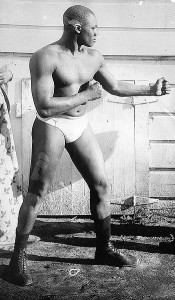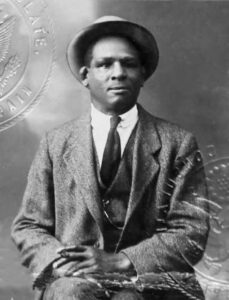Sam Langford vÔitleb Dixie lapsega
Nagu olen mitmes postituses kirjutanud, vahel parimad raskekaalu poksijad 1900 ja 1919 olid Aafrika-Ameerika poksijad sunnitud omavahel vĂ”itlema “VĂ€rvilised meistrivĂ”istlused”. Isegi pĂ€rast seda, kui suurepĂ€rane Jack Johnson lĂ”puks vĂ€rvijoone murdis ja raskekaalu maailmameistritiitli vĂ”itis, ta kaitseks tiitlit ainult valgete kandidaatide vastu.
Tulemusena, the toughest challengers were never given an opportunity to win the recognized World Heavyweight Championship. One of the black fighters, who would almost assuredly been World Champion at some point was Sam Langford. An Afro-Canadian born in Nova Scotia in 1886, Langford was successful as a lightweight, welterweight and heavyweight.

The Great Sam Langford from the Public Domain
On jaanuar 10, 1910, Langford was the recognized Colored World Heavyweight Champion. He was in Memphis, Tennessee, to defend his title at the Phoenix Athletic Club against former welterweight champion the Dixie Kid.
The Dixie Kid was born Aaron Lister Brown on December 23, 1883 in Fulton, Missouri. Sisse 1904, he won the welterweight title via disqualification in the last round of a fight he was clearly losing to Barbados Joe Walcott.
The title win was later set aside, when an investigation revealed that referee “Duck” Sullivan had a large bet on the Dixie Kid to win the fight. The Kid continued fighting and had a solid, not spectacular, karjÀÀri.
While Langford was a small heavyweight at 185 kuni 190 naela, he outweighed the Dixie Kid by 25 naela selle matĆĄi eest. Langford had also defeated the Kid in only five rounds the previous September.
This fight wasn’t much different than the first bout. Langford needed less than the three rounds to beat the Kid, who was knocked down 9 times before Langford knocked him out in the 3rd round. Each time Langford knocked the Dixie Kid down, he would remain on one knee for the full 9 seconds before returning to the fight.

Aaron Lister Brown aka the Dixie Kid from his 1919 passport (Public Domain)
At the time of the match, newspapers discussed the fact that after this fight both Langford and the Dixie Kid were planning to travel to France for several bouts. Many black fighters, such as Sam McVea and Joe Jeanette, found more opportunities in Europe than the United States at the time.
The Dixie Kid retired in 1922. He died at 50 years of age after falling out of a Los Angeles tenement window. The cause of the fall couldn’t be determined.
Langford retired in 1926 at 43-years-old. Langford was blind at the time of his retirement. He moved back to his adopted home state of Massachusettes, kus ta suri 1956 at 69-years-old.
VĂ”ite kommentaari jĂ€tta vĂ”i esitada kĂŒsimuse selle vĂ”i mĂ”ne postituse kohta allpool olevas kommentaaride jaotises vĂ”i minu lehel Facebook lehele vĂ”i Twitter profiili.
Sources: The Bridgeport Times and Evening Farmer, Jaanuar 11, 1910 edition, p. 7 ja Evansville Press, Jaanuar 10, 1910 edition, p. 6
Pin It
